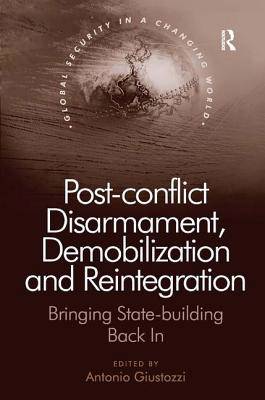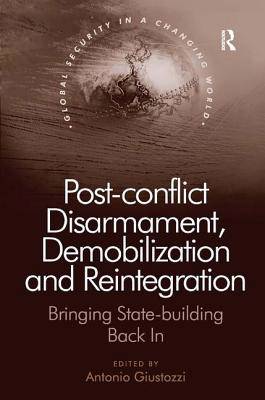
- Afhalen na 1 uur in een winkel met voorraad
- Gratis thuislevering in België vanaf € 30
- Ruim aanbod met 7 miljoen producten
- Afhalen na 1 uur in een winkel met voorraad
- Gratis thuislevering in België vanaf € 30
- Ruim aanbod met 7 miljoen producten
Zoeken
Post-conflict Disarmament, Demobilization and Reintegration
Bringing State-building Back In
€ 305,45
+ 610 punten
Omschrijving
This book revisits post-Cold War Disarmament Disintegration and Reintegration (DDR) programmes in the light of previous experiences of disarmament, demobilisation and reintegration. In the history of North America and Europe, in particular, such programmes had a major impact on state-building, contributing to the development of the welfare state, shaping political settlements and directing government policy to maintain social peace. The authors in this important book ask what is left of these state-building dimensions in contemporary DDR programmes and whether the constraints imposed by international organisations on DDR programmes have more negative effects than positive ones. The role of political leadership in DDR processes is highlighted: can bureaucratically-driven processes deliver success? Only if political elites take full control and manage DDR programmes can there be a lasting impact on state-building. Even then, most political elites avoid deep changes in their relationship with the veterans. Is there a chance of reshaping international intervention in such a way as to favour the development of a 'social contract' between political elites and veterans? In taking a historical perspective, this book is unique in the existing literature on DDR and will be essential reading for policy makers, students and scholars of conflict studies, and those working in NGOs, particularly donor agencies. This volume was produced with the contribution of the Crisis States Research Centre (LSE).
Specificaties
Betrokkenen
- Uitgeverij:
Inhoud
- Aantal bladzijden:
- 160
- Taal:
- Engels
- Reeks:
Eigenschappen
- Productcode (EAN):
- 9781409437383
- Verschijningsdatum:
- 28/04/2012
- Uitvoering:
- Hardcover
- Formaat:
- Genaaid
- Afmetingen:
- 156 mm x 234 mm
- Gewicht:
- 403 g

Alleen bij Standaard Boekhandel
+ 610 punten op je klantenkaart van Standaard Boekhandel
Beoordelingen
We publiceren alleen reviews die voldoen aan de voorwaarden voor reviews. Bekijk onze voorwaarden voor reviews.










